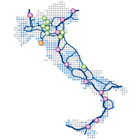
Snam considers sustainability to form an integral part of its business model. It is in fact a leading factor in defining the Company’s strategic and operational decisions and a lever for long-term sustainable growth. Meanwhile it delivers the shareholders’ expected results, sharing the value generated with all of its stakeholders including in terms of environmental and social issues.
The Company bases the day-to-day conduct of its activities on the principles set out by international bodies and conventions on the protection of human rights, employment and trade union rights, health, safety and environmental rights, repudiation of forced labour, child labour and any form of discrimination, and on conformity with values and principles concerning fairness, transparency and sustainable development. These principles are listed in the Code of Ethics adopted by all the Companies, which are the basic tools for guiding the conduct of personnel and for responsible management of relationships with the stakeholders.
In order to give greater visibility to this commitment, Snam is a signatory to the UN Global Compact. This international initiative upholds ten universal principles concerning human rights, employment, the environment and the fight against corruption, and brings together governments, businesses, United Nations agencies, labour organisations and civil associations, with the aim of contributing to the creation of a more inclusive and sustainable global economy. Snam’s commitment to the Global Compact also continued in 2012 with numerous activities for engagement and dissemination of the ten principles by participating both actively, as a member of the Italian Global Compact Network, in the meetings of the Environment and Human Rights Working Group and in specific initiatives aimed at its own stakeholders.
Snam’s sustainability management model extends to all Group companies and is integrated into all phases of the corporate business process (Planning, Management, Control, Reporting, Communication and Stakeholder Engagement). The Board of Directors takes on a central role in defining the policies, while the Sustainability objectives, submitted for the approval of top management, are pursued by means of specific short- and medium-term projects and initiatives included in the Company’s action plan. All of the activities provided for by the model are coordinated by the Snam sustainability office with the participation of the various Snam offices and subsidiaries.
Snam publishes its Sustainability Report annually, which it considers to be an important instrument for strategic control and communication with stakeholders. The Report, approved by the Board of Directors at the same time as the annual financial report, examines the activities carried out according to economic efficiency, environmental protection and social protection, providing the performance indicators on which the business is measured and compared publicly.
The results achieved and maintained over time have enabled Snam shares to maintain their position in the main ethical indices, such as the Dow Jones Sustainability Index World, the FTSE4Good Europe Index, the FTSE4Good Global Index, the ECPI Ethical Index Euro and the Stoxx Global ESG Leaders Index.
Starting in 2012, Snam will be creating its own path to sustainability, in line with the Shared Value approach that places high value on the connection between the economic system and society and redefines the boundaries of corporate social responsibility. The premise of this new concept is that companies need to take action to reconcile business and society by placing a high value on knowledge, best practices and current or possible future initiatives: in short, to create economic value in ways that generate value simultaneously for the Company but also for the stakeholders and the locations where it operates.
Following this approach, the Company has, during the year:
- started mapping some of the processes capable of driving value generation;
- implemented several initiatives;
- initiated additional processes to identify possible new projects that maximise positive external results.
SHARED-VALUE PROJECTS IN 2012
| Download XLS (22 kB) |
|
Scope for generation of Shared Value |
Initiative |
|
Within the framework of supplier relationships, making corporate know-how available through a system of knowledge sharing, which will help companies in the supply chain in a process of continuous improvement that can increase both their own competitiveness and the dependability of their partnership with Snam, to the ultimate benefit of service quality. |
My safety is your safety |
|
Legality Protocols | |
|
The Suppliers’ Portal | |
|
As part of the Snam’s management and enhancement of sites and infrastructure, sharing space and knowledge with stakeholders in the area, to encourage public acceptance of the legitimacy of the networks and the creation of competitive advantage for the area. |
GNL Italia shares a new green area with the local area |
|
The Italgas Historical Archive and Museum: an historic asset for the community | |
|
As part of the implementation of new investments, sharing with local communities and disseminating among local protagonists knowledge of best business practices in the application of naturalistic engineering techniques in particularly delicate areas with complex ecosystems, such as parks and protected areas. |
Sustainable trails for the Parco di Nebrodi, Sicily |



